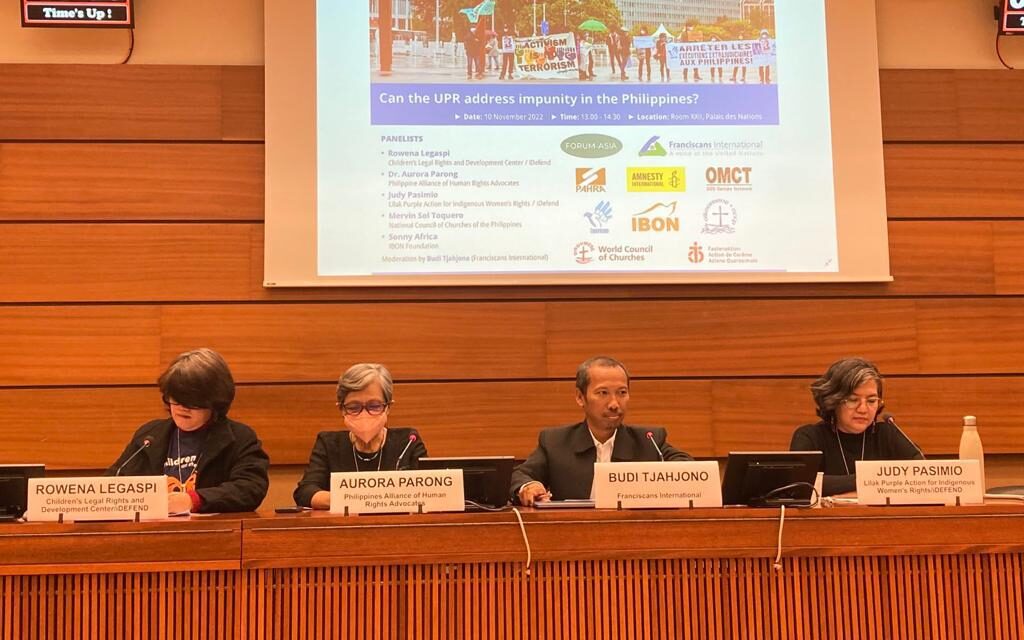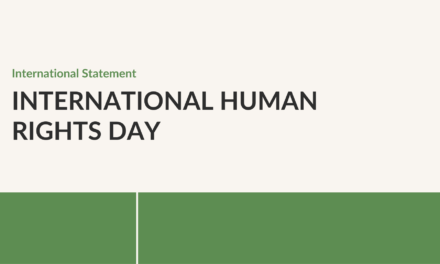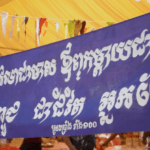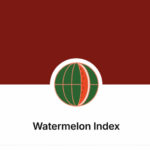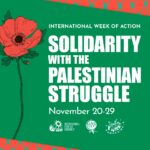As Social Justice and human rights activists we take solace in the fact that social justice and human rights are enshrined in our Constitution. It is important to be reminded of this fact and to look at the promise of social justice in terms of the State’s obligations as stated in Article 13 “ to protect and enhance the right of all the people to human dignity, reduce social, economic, and political inequalities, and remove cultural inequities by equitably diffusing wealth and political power for the common good.” These obligations also serve as the parameters by which one must measure progress in the attainment of social justice.
The Constitution underscored 6 main areas: labor, agrarian and natural resources reform, housing, rights of women, and role and rights of people’s organizations. I will not be able to cover all these areas in the five minutes given for this presentation, so I would like to focus on the issues of land and agrarian reform, labor , and the role and rights of people’s organizations, knowing that the issue of rights of women and gender justice will be covered more adequately by the other speakers.
But before going into specifics, there is the broad challenge against the constitutional mandate itself presented by the continuing, and persistent push and renewed attempts to amend the Constitution. Previous articulation of charter change proposals have zeroed in on the economic provisions but also affecting the fundamental social justice and HR provisions.
It’s also important to situate the continuing struggle for social justice in the context of the multiple crises not just in the Philippines but across the globe. We are facing crises in agriculture and food manifested in rising food prices, and increasing food insecurity; were facing continuing threats from climate change and destruction of our natural resources; social and economic inequality (and wealth concentration), the crisis of human rights, and of course the continuing crisis brought about by Covid pandemic.
The impacts of these crises are felt differently by different segments of the population, with the poor and marginalized carrying the greatest burden. 2021 numbers show an 18.1 percent poverty incidence which translates to around 19.99 million Filipinos who live below the poverty threshold. This represents a 1.4 percent increase from 2018 or almost 2 million Filipinos joined the ranks of the poor in three years.
How the new government responds to these crises is a key concern. Will the policies and programs outlined in its development agenda advance the principles of social justice- access, equity, participation, diversity and human rights.
I would like to highlight a few specific challenges, which we can also transform into opportunities and prospects for advancing the struggle for social justice
On the broad area of Food and Agriculture
Challenges:
- Food Insecurity and Hunger- Incidents of hunger rose during the first quatrter of 2022 to 11.8 percent representing over 3 million families. The State of Food and Nutrition report of 2021 found that 7 out of 10 Filipinos cannot afford nutritious food.
- Decreasing food self sufficiency and Increasing dependence on imported food- this has underscored the Philippines vulnerability to food inflation as the country with the largest food trade deficit in the region at negative 2 percent of GDP in the past three years according to a Carnegie Endowment report.
- Central issue of land and natural resources- continuing conversion of agricultural lands, land grabbing, land degradation from chemical farming, reclamation of traditional fishing grounds
From these challenges, rise the need to transform the food system. But what kind of transformation and who will lead this process are again key challenges ahead. For peasants and small food producers, the adoption of sustainable agricultural practices such as agroecology, by small farmers, small fishers and small farming and fishing communities that provide some 70 per cent of the world’s food should be at the heart of this transformation. This is the key to achieving genuine food security while contributing to the mitigation of multiple environmental crises.
On agrarian reform
The challenge: completing land distribution under the CARP/ER program and helping agrarian reform beneficiaries in making their lands productive. Targets have decreased alarmingly since the expiration of the land acquisition and distribution program in 2014. Without an enabling law, the DAR operates only on lands identified before the 2014 deadline of RA 9700 or CARPER.
Marcos has vowed to continue program focusing on making agrarian lands productive but it has not put forward a clear directive to Congress to prioritize the enactment of a new law to to continue land acquisition and distribution; no clear plan on how his administration will address long standing issues like land grabbing, reversal of gains from agrarian reform program, and massive land conversions.
Instead the focus seems to be on palliative measures like aid for agrarian reform beneficiaries, and condonation of loan payments which are more populist than strategic interventions.
There are bills in Congress, a couple of these sponsored by Sen. Imee Marcos are calling for emancipation of tenants ( a throwback to Marcos years with strong references made to Marcos’ own PD 27). Farmers are wary however of provisions in these proposed measures on farm land as collateral (section 11), and land conversion (sec 12), expanding exclusion (sec 15) that could further institutionalize rather than address these problems.
Then there is also the continued criminalization of land rights defenders, most notable nwo through the proliferation of slapp-cases. The farmers group Katarungan has documented several cases of judicial harassment and criminalization against land rights defenders. In a few cases in Quezon province, farmers have been charged with qualified theft for merely getting fruits from contested land. Another more recent case in Bataan just last January 6, 9 farmers including 8 women, some in their late 60s have been charged with syndicated estafa for soliciting money from members of their organization to support the processing of their agrarian reform claims.
These challenges present an opportunity to re-examine the record of the State on its obligation on agrarian reform and intensify the struggle for a new agrarian reform law.
On the environment and natural resources, CSOs see as a positive development and welcomed the appointment of Maria Antonia Yulo Loyzaga, former Chairperson of the International Advisory Board of the Manila Observatory. The new DENR Secretary has exhibited an openness to dialogue with CSOs.
Environment groups like Alyansa Tigil Mina (ATM) however have also expressed some concerns and see a more challenging and complicated context under the Marcos-Duterte administration with the Increasing influence of politicians and corporations and the continued red-tagging, harassment and criminalization of environmental defenders.
There is also the opportunity for intensified campaigning on the environment brought about by the UN Declaration on the Right to a Healthy Environment; as well as the report from the Commission on Human Rights on its National Inquiry on Climate Change, where it was found that the major carbon polluting companies can be held liable for human rights violations arising from climate change.
On labor issues
The sector faces challenges related to job losses , at the height of the pandemic, the country lost over 7.3 million jobs, while employment numbers have improved, the long term impact on employment will continue to be felt. Contractualization remains a key concern for workers. On the aspect of labor rights, ILO warns that “workers in NSE may lack access to freedom of association and collective bargaining rights either for legal reasons or because of their more tenuous attachment to the workplace. They may also face other violations of their fundamental rights at work, including discrimination and forced labour.
The violations of labor rights are happening in the context of a deteriorating human rights crisis in the Philippines where we have seen direct attacks against workers.
The ILO High Level Tripartite mission that will take place this month presents an opportunity for workers to highlight the cases of labor rights violation and killings of labor rights activists and begin the process of bringing to justice those responsible for these crimes.
On overall economic policies, we see two main drivers of economic policy of Marcos:
- Legacy of his father’s administration
- Continuity of economic policies/securing the confidence of the business sector
The high growth projections (6.5-8 % from 2023-2028) are anchored on policy reforms achieved by the previous administration (amendments to the foreign investments, public services, retail trade, etc)
Continuation of trade and investment liberalization (engagements in RCEP at IPEF)
Corporations as main drivers and government partners toward economic recovery and development- A private sector advisory council (PSAC) was established giving business leaders, the CEO’s of top corporations enormous influence to shape economic policies. There are concerns over increasing corporate capture of policies especially since no same privileged access is given to civil society and social movements to shape economic policies based on their demands and aspirations.
Opportunity
Need to strengthen mechanisms for corporate accountability both at the domestic level as well as regional and international; PH still has no National Action Plan on BHR, it continues to engage in the negotiations for a legally binding instrument on TNCs and OBEs and HR. Intensification of these campaigns are warranted.
Role and Rights of People’s Organizations and Human Rights Defenders
Over the last 6 years, what we have experienced is the demonization of human rights and the criminalization of the defense of these rights. We have witnessed shrinking of the democratic space especially in the context of the militarized Covid response but also the all out counter insurgency programs of the previous administration. We highlighted earlier as well the increasing cases of judicial harassment and slapp cases against land and environmental rights defenders that undermine public participation and the right to dissent. The persistent red tagging of activists and HRDs also continues to be a major concern that was clearly articulated by several States during the UPR.
There is now an even greater need to push for the passage of legislation such as the Human Rights Defenders Bill pending in Congress, and the revival of proposals to combat slapp cases.
It is our contention that the widespread and systematic violations of human rights result not just from the anti-illegal drug campaign of the government, nor just from its intensified counterinsurgency program, but from the relentless pursuit as well of a neoliberal and pro-corporate development agenda.
Therefore a full human rights and social justice agenda should include mechanisms to protect the rights of land and environmental defenders including their right to be consulted on various development projects; and their right to express dissent against these policies and projects. It should also include stronger mechanisms to regulate the operations of businesses and provide justice to affected communities.
* Presentation made on behalf of the Social Justice Campaign Working Group of IDEFEND at the UPR Stock Taking with Diplomatic Missions organized by the Embassy of Canada and IDEFEND. 18 January 2023

